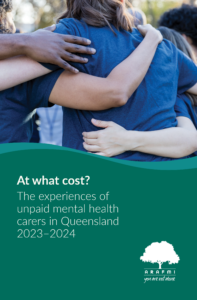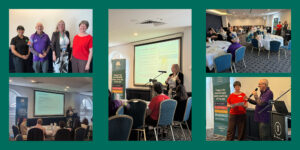Arafmi’s inaugural mental health carers report: ‘At what cost? The experiences of unpaid mental health carers in Queensland 2023 – 2024’
“At What Cost?” collates and analyses the feedback from carers in consultations held by our Advocacy Team, late last year. The report has been mailed out to all State MPs, Queensland-based Federal MPs, senior public servants and other stakeholders. Follow-up meetings will occur to raise awareness of the systemic reforms that carers need.
In this report, Arafmi has identified six areas for action that will guide our advocacy work over the next two years:
- Raise awareness of mental health carers so that they can be better recognised and supported.
- Advocate for physical, emotional, social, mental health, and practical support for mental health carers.
- Facilitate access to relevant information and training for mental health carers.
- Promote carer inclusion in mental health treatment planning and implementation.
- Increase financial assistance for carers.
- Advocate for inclusion of the voices of mental health carers in mental health reform.
A summary of the key findings and recommendations can be found in the document below:
"You often find out the hard way what’s available and what would’ve helped in the early stages. It would be good to have someone support you from the beginning and throughout the journey to help connect to services.”
Focus group participant
"When you lose yourself in life due to caring, that's wwhen you become a carer. You aren't just a mum or dad.”
Focus group participant




